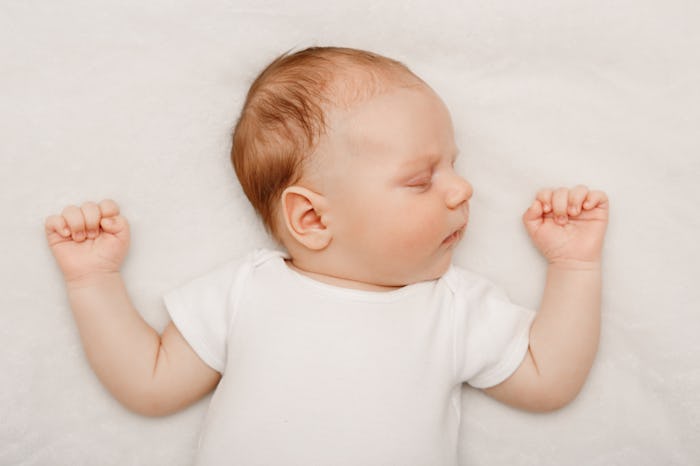Life
Here's How Many Onesies You Should Actually Stock Up On For Your Baby
Shopping for baby clothes before your little bundle arrives can be a blast, but the experience can also be a bit misleading. So many of the cutest outfits turn out to be completely impractical. And while of course there's nothing wrong with indulging in some tiny, trendy clothes, you don't want to fall short when it comes to essential basics like onesies, either. But how do you know when you have enough? How many onesies do you actually need to own?
As with most things related to raising kids, the answer to that question depends on the parent you ask. While there are no hard and fast rules, there are conflicting schools of thought when it comes to what constitutes an appropriate baby wardrobe. One thing pretty much everybody can agree on, though, is the unparalleled usefulness of the onesie. As a mother of three, I totally get it: Not only can a onesie serve as a complete outfit when it's hot outside, but these snap-at-the-crotch wonders are crucial for layering when the weather is cold, too. Wondering why babies can't just wear regular shirts? Well, they can — but I can also guarantee that their tummies will be totally exposed to the elements more often than not (particularly when someone is lifting them up from under their arms). Onesies will keep your little one's belly covered up no matter how much she moves around, and most are equipped with envelope necks so they're easy to pull over your baby's head (the same can't necessarily be said for regular baby shirts, sadly).
Hence the need for multiple onesies in your life. As BabyList founder Natalie Gordon wrote on Momtastic, "Is it even possible to have too much baby clothing? Considering you might need to switch outfits five times a day (hello, spit up!) the truth is — probably not."
Gordon recommended having seven onesies on hand, assuming you have "easy access to laundry and can wash at least every other day." If you can only wash once a week, however, Gordon advised doubling your number of onesies to 14 (which makes perfect sense).
Considering how indispensable onesies can be, it makes sense that you'd want to have one for every day of the week, right? Or do you need even more, in case you have a few days (or even hours) in a row of big-time diaper blowouts? After all, life with a baby is pretty unpredictable. Some days, a single onesie might last you from morning until bedtime; other days, you might go through five by mid-afternoon.
One thing to consider before you buy is the age of your baby (and how fast she happens to be growing). As an article on BabyCenter pointed out:
"Parents typically don’t need a lot of 'newborn'-size clothing, as babies will quickly outgrow it. You also won’t know until you meet your baby what size she’ll start at."
While every brand is slightly different, most onesies sized 0 to 3 months are for babies between 7 to 12 pounds (this is the case at The Gap, for example). If your baby is born on the small side and doesn't double her weight almost instantly like some babies do, you might actually get 12 weeks or so out of onesies sized 0 to 3 months. If, on the other hand, you give birth to an 11 pounder who grows out of his newborn clothes before his 8 week check-up, you might end up with way more mini onesies than you can use if you buy too many.
In the long run, onesies are fairly inexpensive (especially compared to the rest of the clothing you'll be buying your kid for the next 18 years or more), so it's probably better to have a few too many onesies than to come up empty-handed. You can always donate the onesies you don't use to charity, or pass them on to an expecting friend or family member. She might not be overly excited about a bag of discarded onesies at first, but she'll appreciate the gesture once that baby shows up.
Check out Romper's new video series, Bearing The Motherload, where disagreeing parents from different sides of an issue sit down with a mediator and talk about how to support (and not judge) each other’s parenting perspectives. New episodes air Mondays on Facebook.
